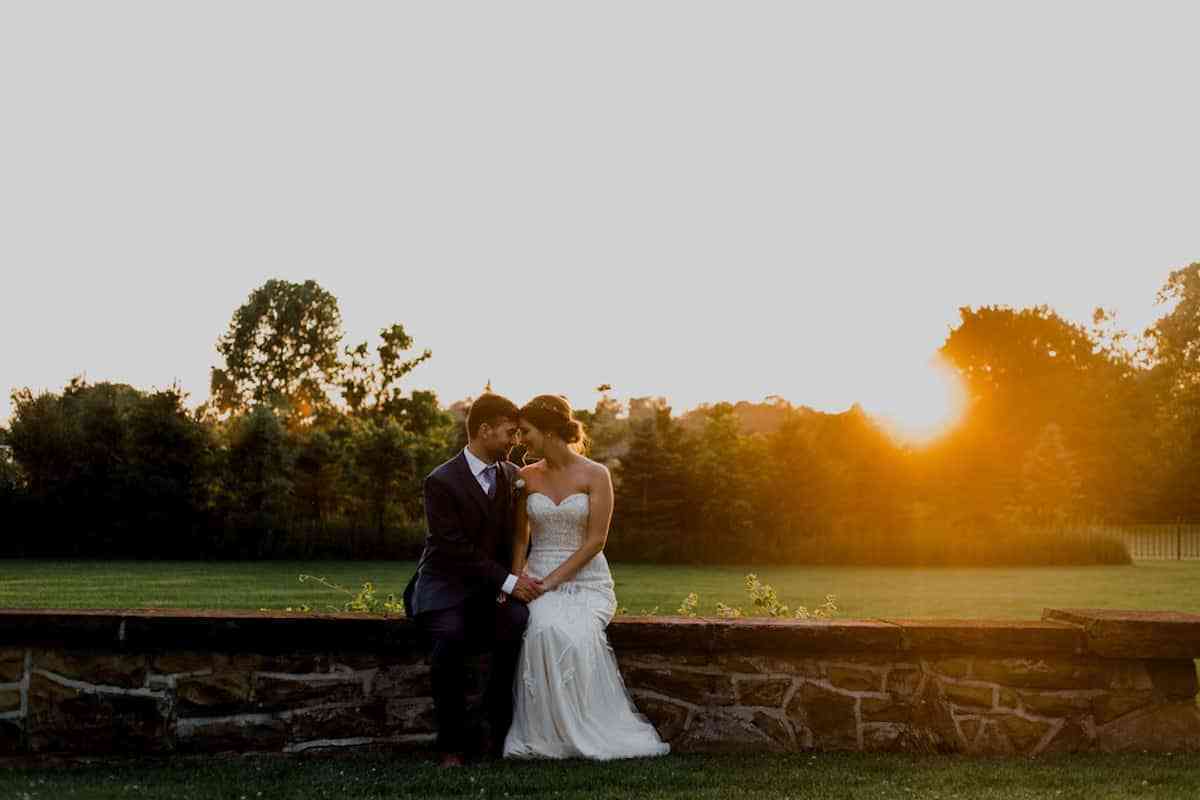- Expert advice/
- Wedding planning 101/
- Creating a budget/
- Should We Get a Loan for Our Wedding?
- Creating a budget
Should We Get a Loan for Our Wedding?
Taking on wedding debt may seem like the only way to fund your big day, but are wedding loans a good idea? Financial experts weigh in on personal loans for weddings and share their tips for sticking to your budget.
Last updated October 13, 2025

Want to keep track of your wedding budget? Try our free budget tool with payment reminders and tips on how much to spend.
Let’s face it: weddings aren’t cheap. If you’re in the midst of planning your big day, you know how easy it is for expenses to add up. Between the venue, food, flowers, and entertainment, the average wedding in the U.S. costs around $30,000.
Most couples don’t have tens of thousands of dollars sitting in the bank, though. In fact, plenty of people already have debt, including credit card and student loans. Unless you’re getting financial support from family or have lots of personal savings, going into wedding debt isn’t out of the question.
Borrowing money may seem like the only solution to fund your nuptials, but is it a good idea to spend more than you can afford? According to financial experts, the short answer is no.
“While I often see shades of grey in personal finance conversations, weddings are one area where I take a very firm stance,” says Erin Lowry, a millennial personal finance expert and author of the book Broke Millennial.
“You should not go into debt for your wedding.”

Let’s take a look at everything you need to know about wedding financing:
What Are Wedding Loans?
Wedding loans are personal loans taken out with the purpose of covering wedding costs. Couples take out wedding loans when they don’t have the cash to cover all of their wedding expenses—and leads to holding wedding debt.
Wedding debt happens when we spend more on our rings, dress, venue, or decor than we can currently afford. Because weddings are personal events tied to emotion, going over your wedding budget is pretty common.
How much are we talking about?
According to a recent LendEDU wedding debt survey, one-third of respondents said they went into some sort of debt to pay for their big day—an average of nearly $12,000. The survey found people mostly borrowed through credit cards and personal loans.
What’s more, nearly 40% of respondents said they regret taking on the debt and estimated it will take them about five years to pay off.
Wedding debt is becoming so common that online lenders reported they issued up to four times as many loans to engaged couples in 2019 than they had the year before. This makes sense given the increasing costs of weddings paired with society’s mounting debt.
Pros and Cons of Financing Your Wedding With a Loan
Pros
There are some definite upsides to taking out a personal loan to cover your wedding expenses, including:
It’s a convenient way to get upfront money.
If you need money to cover wedding costs—and you need it now—personal loans are a great way to get the cash you need quickly. Once you go through the application process, you can typically receive your funds within days—sometimes even within 24 hours.
This kind of financing can be easy to get.
The kind of loans you would use to finance your wedding (for example, unsecured personal loans) generally have lower eligibility standards than other types of financing, like a mortgage—which can make it easier to secure financing.
Improve your credit score.
Taking out a personal loan can also help to improve your credit score. If you’re responsible in paying back your loan—for example, by abiding by the repayment terms and making payment on times—it proves your creditworthiness. This can help to increase the credit score on your credit report—and can make it easier to get loan funding and other types of financing in the future.
Lower interest rates than credit cards.
If you’re looking for a low interest rate, you’re going to have a much better time paying for wedding costs with a personal loan vs. paying with a credit card. Personal loans generally have significantly lower interest rates than traditional credit cards, particularly if you have excellent credit and a solid credit history—which can save you a lot of money on interest.
Cons
Now, let’s take a look at the down sides of financing your wedding with a loan.
Comes with interest charges.
When you finance your wedding—instead of paying in cash—you’re going to have to pay interest charges. The amount you pay interest will depend on your credit (if you have bad credit, you can expect a higher interest rate—and higher costs). There are also additional fees associated with the loan—like prepayment penalties, origination fees, credit check fees, or late fees.
Debt can lead to more debt...
Before taking out a loan, consider your financial future. Wedding debt is dangerous, says Jessica Moorhouse, a financial counselor and host of the Mo' Money Podcast, and it can easily snowball.
Once you take on a loan, you not only have to worry about paying it back—but with interest. It’s not unusual to be offered a loan rate of 30% if you don’t have good credit, and most credit cards have interest rates of around 20%.
May encourage overspending.
There’s certainly societal pressure to spend. Many of us want that “Pinterest-perfect” wedding, which can result in making purchases we don’t really need. Put friends and family’s opinions in the mix, and it’s understandable to see how things get out of control. “There is also the social media pressure of showing off and trying to make something about your wedding non-cookie cutter,” Lowry says.
Plus, families come in all shapes and sizes—and some are huge. “Some families are large and you need to invite everyone, which makes it hard to trim the costs because the most effective way is to reduce the guest list,” Lowry says.
You’ll be starting out your marriage in debt.
Lowry adds that entering a marriage with thousands of dollars in wedding debt can put pressure on a couple right away. Not only do you both have to commit to paying it off, but it can also affect your ability to pay for your future, including purchasing things like a house or car.
“One of the leading reasons couples fight is over money, so putting yourself—or your parents—into debt for a wedding starts off your marriage with a financial burden,” Lowry says. “That might be getting added onto existing debts like student loans, auto loans, or credit card debt.”
Wedding Financing Advice
Need some more insights on financing your wedding? Here are a few tips to keep in mind.
Consider alternate ways to fund wedding costs.
Before you apply for financing, think about alternative ways you can cover your wedding costs. For example, do you have any friends or family members that would be willing to loan you the money? Even if they want to charge you interest on the loan, chances are, their loan terms would be much more competitive than what you’d pay in personal loan rates.
Explore different loan options.
If you do decide to secure a loan to cover your wedding costs, make sure to shop around to find the best loan. Exploring different loan options (for example, is it more affordable to apply for a loan or line of credit with a cosigner? Does one lender offer a more competitive fixed rate than another?) can be a great way to save money—and ensure you get the best loan.
Don’t assume you’ll make back the loan amount through wedding gifts.
While most guests give couples either something off their registry or a cash gift, it’s not a good idea to assume you’ll “make back” the cost of your wedding, experts say. First of all, there’s no guarantee you’ll be gifted a certain amount of cash, which could lead you to over budgeting.
“Unless you have a really modest wedding, you shouldn't expect to make a dent in the cost through your guests’ gifts,” Lowry says.
For couples who did take on wedding debt, LendEDU’s survey found that nearly 60% of couples used wedding gifts to put towards their loan payments.
Secondly, Moorhouse says even if you do expect to receive money, it’s better to put that money towards your future. Again, this comes back to starting off your life together in the best financial shape as possible. “What you should be doing with any cash gifts really is setting a financial foundation for you and your new spouse or spending it on your honeymoon.
Stick To Your Wedding Budget
The key to combating wedding debt is budgeting. It’s important to understand how much you can afford to spend on your wedding before you start booking vendors. Create a wedding budget, and do your best to track spending so you don’t go overboard. (Don’t forget about the sneaky costs so many of us overlook, either.)
Priorities can make all the difference. “It's important you sit down with your fiance and discuss what is actually important to the two of you,” Lowry says. “I recommend picking three things and those are the areas where you funnel more of the wedding budget to get what you want. Other things don't matter as much and you can use more cost-effective options or, in some cases, nix it entirely.”
Moorhouse echoes this and suggests couples spend time saving for their wedding. This not only gives you the chance to curb impulse spending, it will also allow you to track your finances more closely.

OK, so you took on wedding debt. Now what?
Not taking on any wedding debt is the ideal situation, both experts agree. But what happens if you did borrow some money to pay off vendors?
The first thing to do, Lowry says, is pay off as much as you can and as soon as you can. Paying off well above the minimum amount due on monthly payments can help attack the principal balance of your credit card debt or loan, she says.
If you have multiple forms of debt and can’t afford to pay much more than the minimum payment on each, the important thing is you still make these payments—not let the loan grow.
Moorhouse, who got married seven years ago, says she is glad she didn’t spend more than she could afford on her wedding. Still, she thinks she could have cut costs even more. “I wished we had a smaller ceremony and reception and used that money for something better, like putting a down payment on a home, setting up a family emergency fund, or investing for our futures,” she says.
“The most important thing to remember is that your marriage is more important than your wedding day.”
Up next for you

Average Cost of Weddings in 2026: Vendor Price Guide
Advice
Average cost of weddings in 2026: See national averages for venues at $8,573 and catering at $6,927, plus key vendor costs to plan your budget.

29 Ways to Cut Wedding Costs
Budgeting
Need to cut wedding costs? Here are five ways to do so that you might not have thought about. Read up, and get ready to spend smart!

How Much To Tip Wedding Vendors
Inspiration
Confused on how much to tip wedding vendors, which vendors to tip, and when to distribute tips? Fear not: explore our guide for tipping wedding vendors.
Featured

Wedding Photographer Cost: What Couples Really Pay
Advice
Wedding photographer cost averages $3,300 to $5,300 nationwide, varying by location, experience and hours. Find out what couples pay and how to set your budget.

How to Book Hotel Rooms for Your Wedding Guests
How-To
Check out our comprehensive guide on how to book hotel rooms for your wedding guests to learn the ins and outs of this sometimes-tricky task.

How to Choose a Wedding Caterer + 4 Tips
How-To
Food is a wedding highlight for most guests. So, you want it to be good. Quickly narrow down your options (and eat some really good food) with our guide to finding the perfect wedding caterer.

41 Questions to Always Ask Wedding Photographers
Inspiration
You’ll be reminiscing on your wedding photos for years to come. These questions to ask wedding photographers will help you hire someone whose style you love!
- Expert advice/
- Wedding planning 101/
- Creating a budget/
- Should We Get a Loan for Our Wedding?
Find even more wedding ideas, inspo, tips, and tricks
We’ve got wedding planning advice on everything from save the dates to wedding cakes.
